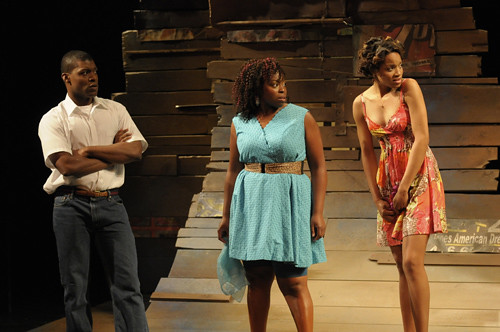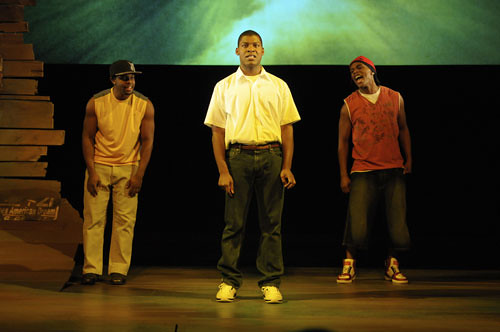Marcus, or how Sweet it is
Richard Prioleau, Omoze Idehenre (center) and Shinelle Azoroh play best friends in Tarell Alvin McCraney's Marcus; or the Secret of Sweet. Below: Prioleau (center) fantasizes about schoolmates played by Tobie L. Windham (left) and Jared McNeill. Photos by Kevin Berne
We met him as a baby. Then we got to know a little bit more about his father. And now we get to watch Marcus Eshu make his first steps into manhood.
Tarell Alvin McCraney's Brother/Sister Plays cycle is extraordinary, if for no other reason than its admirable ambition. But this trilogy of plays is so much more than admirable – it's poetic, insightful, gripping and full of beauty. When the plays finally arrived in the Bay Area, they arrived in the form of a colossal collaboration of theater companies.
We were exposed to McCraney's talent in Marin Theatre Company's In the Red and Brown Water, a drama so full of wondrous movement and music and myth that in memory it seems more folklore than contemporary drama. Then the drama was scaled down to size, to The Brothers Size, at the Magic Theatre, and we felt the emotional heft of McCraney at his dramatic best.
The stretch between parts 2 and 3 was long, but the wait was worth it. American Conservatory Theater's Marcus; or The Secret of Sweet takes us back to the housing projects of the fictional San Pere along the Louisiana bayous. The play is yet another spin of McCraney's enormous talent. If Red and Brown Water was folklore, and Brothers Size was poetic drama, Marcus fills the slot in the coming-of-age category. This may be McCraney's most conventional play, but it's also his funniest and most endearing.
That said, the play also feels less fully formed than its predecessors. There are rich rewards in the humor and the performances here, but McCraney leans heavily into some sitcom-ish characters and beats an incessant drum for the impending storm (which may or may not be Hurricane Katrina), and that pounding gets old without ever adding up to much.
As much as I liked Richard Prioleau in the central role of Marcus (whom we met as a babe in arms in Red and Brown Water), it took a tremendous suspension of disbelief to accept him as a 16-year-old. If you can get over the fact that Marcus appears to be a strapping lad in his mid-20s, it's fascinating to watch Prioleau inhabit the body of this young man, who demonstrates so much insecurity, along with flashes of strength and rebellion, in his tightly held body.
This is a young man of tremendous feeling who wants to hide those feelings at any cost. His whole world calls him "sweet" – the local vernacular for gay – but he thinks he might be able to sneak by without anyone actually knowing the truth. But the truth, as they say, will out. Marcus' dad, Elegba (so charming in the first play, so sinister in the second), has just died, leaving his son with a whole lot of questions nobody will answer.
It seems Marcus' dad was sweet too, but Marcus' mom, Oba (Margo Hall), will definitely not be having that conversation. Funny old Aunt Elegua (Hall again) is more willing to talk, but when she hears Marcus is having dreams about a storm – dreams like Marcus' dad used to have – she loses it.
The best parts of the play involve Marcus and his two best girlfriends, Shaunta Iyun (Omozé Idehenre) and Osha (Shinelle Azoroh). Shaunta doesn't take any crap, not even from Marcus. She knows the truth and she's willing to talk about it. Osha is in love with Marcus, so she sees only what she wants to see. Idehenre pretty much steals every scene she's in because she's able to play the comedy, fill the giant stage and somehow keep her performance grounded in reality.
The only real guidance Marcus has comes from Ogun Size (Gregory Wallace), a man we've come to know a little better in each play. Ogun's story picks up almost directly from the end of Brothers Size after he has sent his little brother, Oshoosi, off to Mexico to escape the long arm of the law. Wallace gives us a brittle, barely standing Ogun, but his interaction with Marcus is poignant. Still, I have to say I craved the solid man-of-the-earth practicality of Joshua Elijah Reese, who played Ogun in The Brothers Size.
Happily, the wonderful Tobie L. Windham reprises his Size role as Oshoosi, and he provides the evening's most dramatic through line. It turns out that Marcus' coming out and coming to terms isn't the real story here. It's much more about Marcus' dreams and how Oshoosi figures into them. But there's something I don't understand: why does Oshoosi interact with the audience the way he does? He keeps promising us he'll stop using the "n word." But if this is Marcus' dream, why does he care what we think about his language?
Director Mark Rucker attempts to make the giant ACT Theater more intimate by augmenting the simple set by Loy Arcenas (a few moving panels, a platform that raises and lowers) with a stage-wide screen full of Alexander V. Nichols' projections. There are some gorgeous images, but as the other two productions did, we need the drama and the beauty to come primarily from the actors and the writing.
Family secrets, inescapable legacies and garden variety teen angst all come into play here with varying degrees of success. Marcus is entertaining for much of its nearly two hours, but it doesn't have the impact of the previous two plays. But as the third part of a trilogy, there's something bigger at work here.
The pleasures of the individual plays were many, but the real triumph came in the collaboration between ACT, Marin Theatre Company and the Magic. The Brother/Sister Plays turned out to be this fall's theatrical World Series win. There won't be a ticker-tape parade down Market Street for all the artists involved, but there really should be.
FOR MORE INFORMATION

